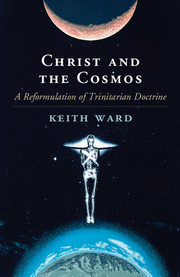Book contents
- Frontmatter
- Contents
- Preface
- Acknowledgements
- PART I THE THREEFOLD NATURE OF THE DIVINE BEING
- PART II THE BIBLICAL SOURCES OF TRINITARIAN THOUGHT
- PART III THE TRINITY, IMMANENT AND ECONOMIC
- PART IV THE SOCIAL TRINITY
- 22 Persons and Substances
- 23 The Idea of a Personal and Free Creation
- 24 The Logical Uniqueness of Persons
- 25 The Divine Nature and Freedom
- 26 Freedom in God and in Creatures
- 27 Persons as Necessarily Relational
- 28 An Ontology of the Personal?
- 29 Intra-Trinitarian Love
- 30 Infinite Gods
- 31 Divine Love and Necessity
- 32 Love and Alterity
- 33 Trinity versus Monotheism
- 34 The Passion of Christ
- 35 God and Abandonment
- PART V THE COSMIC TRINITY
- Bibliography
- Subject Index
- Name Index
27 - Persons as Necessarily Relational
from PART IV - THE SOCIAL TRINITY
Published online by Cambridge University Press: 05 September 2015
- Frontmatter
- Contents
- Preface
- Acknowledgements
- PART I THE THREEFOLD NATURE OF THE DIVINE BEING
- PART II THE BIBLICAL SOURCES OF TRINITARIAN THOUGHT
- PART III THE TRINITY, IMMANENT AND ECONOMIC
- PART IV THE SOCIAL TRINITY
- 22 Persons and Substances
- 23 The Idea of a Personal and Free Creation
- 24 The Logical Uniqueness of Persons
- 25 The Divine Nature and Freedom
- 26 Freedom in God and in Creatures
- 27 Persons as Necessarily Relational
- 28 An Ontology of the Personal?
- 29 Intra-Trinitarian Love
- 30 Infinite Gods
- 31 Divine Love and Necessity
- 32 Love and Alterity
- 33 Trinity versus Monotheism
- 34 The Passion of Christ
- 35 God and Abandonment
- PART V THE COSMIC TRINITY
- Bibliography
- Subject Index
- Name Index
Summary
I have tried to throw doubt on the claim that persons are logically different from substances, as well as on the claim that persons are absolutely free, though I have agreed that persons have unique inner lives and are creatively (and, in the human case, morally) free. But the most important characteristic of persons, for the Cappadocians, is that persons are essentially relational beings: ‘the person cannot exist without communion’ (Zizioulas, 1985, p. 18). Persons cannot exist as isolated individuals, and so Father, Son, and Spirit, if they are persons, can only exist in the closest relationship to one another – in communion. The divine being ‘precludes individualism and separation’ (Zizioulas, 1985, p. 49). The three persons are not individual examples of a common kind, each of which could exist apart: ‘none of them can be conceived apart from the rest’ (Zizioulas, 1985, pp. 48–49). It is not just that they cannot exist apart; they cannot even be conceived to exist apart.
There is, of course, despite what Zizioulas says, a nature they share – ‘being indivisibly one of three’. This marks a great difference, not a similarity, between Trinitarian and human persons, who can be conceived apart and are individuals. Human individuals live in society, and that is a very important fact about them. But they can live in solitude; they can live in various different groups, and move to new groups if necessary; they are not indivisibly united to a group of other people. But the persons in the Trinity are so united; they are essentially relational and essentially related to just two other specific persons. There are essentially three and only three persons united in the Trinity, whereas human persons live in many varied networks of social relationship, which can vary markedly over a lifetime.
It is hard to see why it should be part of the definition of a ‘person’ that a person must be related to other persons. Of course you can simply make that a prescriptive definition: ‘That is what I choose to mean by the term person’. But you must have reasons for recommending such a definition.
- Type
- Chapter
- Information
- Christ and the CosmosA Reformulation of Trinitarian Doctrine, pp. 171 - 175Publisher: Cambridge University PressPrint publication year: 2015



